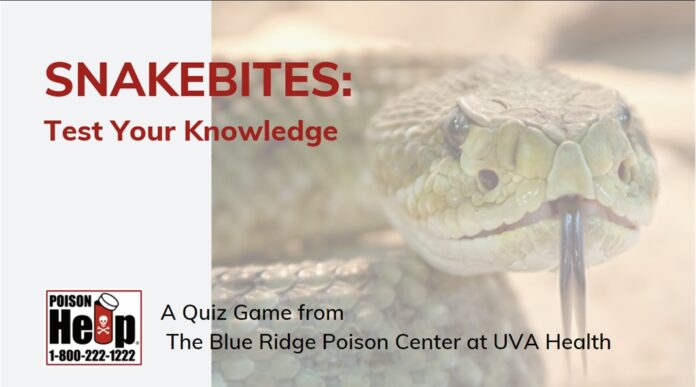Center Has Received More Than 85 Calls This Year for Snakebites
Having received more than 85 calls this year about snakebites, the Blue Ridge Poison Center at UVA Health is sharing tips on how to avoid snakebites and what to do – and not do – if you get bitten.
Avoiding snakebites
Virginia is home to more than 30 species of snakes, including three venomous species: the copperhead, the timber rattlesnake and the cottonmouth (also called the water moccasin). But all snakes, including poisonous ones, will try to hide from you or escape. They will only bite as a last resort. Many bites reported to poison centers are the result of someone trying to catch or kill a snake. Avoid harm by keeping your distance.
When in snake habitats, such as tall grass, rocky areas, or the forest, stay alert. Watch where you place your hands and feet, and always wear long pants and shoes.
Here are some additional tips to protect against snakebites when you’re at home:
- Walk with a flashlight outdoors when it’s dark.
- Keep the area around your home and yard mowed and free of pests, debris, and woodpiles. In other words, don’t let your yard become a place where snakes can easily find food, like rodents, or hide from predators.
- Don’t spread mothballs in your yard; they do not repel snakes and could pose a danger to other wildlife or young children.
What To Do If Bitten
While there are about 3,000 snakebites reported to U.S. poison centers each year, on average less than 10 of those bites result in a death. However, snakebites are painful and require medical care.
Signs of a snakebite include:
- Pain
- Nausea and vomiting
- Muscle twitching
- Swelling with bruising
If you are bitten by a snake, swelling is likely, so remove any tight clothing or jewelry. Go directly to a hospital for medical care and antivenom if required.
What Not To Do
The following actions will not help and could even make things worse:
- Do not use a tourniquet.
- Do not cut the wound or try to suck out venom.
- Do not apply ice.
- Do not give the victim any drugs or alcohol.
Also, doctors do not need to know what kind of snake bit you to treat you. Do not attempt to kill, trap or take a photo of the snake – just leave it alone.
Test your knowledge on snake bites Here.

